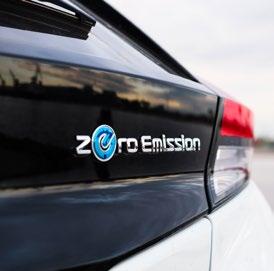Zero Emission Vehicles
More zero emission vehicles—including electric and hydrogen-powered vehicles—on Colorado roads will provide compelling air quality, health and economic benefits across the state. Multiple studies confirm Colorado will see significant economic benefits with higher levels of electric vehicle (EV) adoption including driver savings, downward pressure on electric rates which benefits all ratepayers, and significant reductions in ozone and greenhouse gas (GHG) pollution. Transportation is the second largest source of GHG emissions in the state—and as Colorado’s electricity sector decarbonizes, transportation will become the greatest contributor of harmful, climate-altering pollution.
To accelerate the electrification of cars, buses trucks and other vehicles in Colorado, the state set a goal of 940,000 electric vehicles on the road by 2030—Governor Jared Polis issued an Executive Order Supporting a Transition to Zero Emission Vehicles in January 2019.
The Colorado General Assembly's 2019 and 2021 legislative sessions were monumental for climate and transportation electrification policy. For a brief overview of the clean buildings, climate action, environmental justice, transportation electrification, renewable energy, energy efficiency and just transition legislation that passed during the 2021 session - go to the 2021 Legislative Snapshot. For a brief overview of energy efficiency, electric vehicles and climate/utility policy legislation that passed during the 2019 session - go to the 2019 Legislative Session Snapshot.
In August 2019, the Colorado Air Quality Control Commission (AQCC) voted 8-1 to adopt an alternate Zero Emission Vehicle (ZEV) rule presented jointly by the Colorado Department of Transportation (CDOT) and Colorado Energy Office (CEO) in partnership with the auto industry. Following the ZEV rule adoption, Colorado State agencies, the Alliance of Automobile Manufacturers and the Association of Global Automakers jointly issued statements. Colorado was the first state since 2009 to adopt a ZEV rule, and the first state ever to have the support of the auto industry in adopting a ZEV standard.
The Colorado Secretary of State published the ZEV rule in September 2019, and CEO, CDOT, Colorado Department of Public Health and Environment (CDPHE) and the auto industry co-authored an opinion piece, Why the zero emission vehicle standard matters—and what it means for Colorado. More information about the ZEV rulemaking process is available via the AQCC.
A Strong Foundation for EVs in Colorado
Developed in partnership with CEO, CDPHE CDOT and the Regional Air Quality Council, the state's first Colorado Electric Vehicle Plan was issued in January 2018—an updated Colorado Electric Vehicle Plan 2020 was released in April 2020. The plan set forth strategies and actions to electrify Colorado’s corridors and help ensure the benefits of widespread EV adoption are achieved.
In June 2018, Governor Hickenlooper signed the Executive Order Maintaining Progress on Clean Vehicles, which directed the AQCC to consider a proposed rule adopting a California Low Emission Vehicle (LEV) Standard. The AQCC passed the Colorado Low Emission Automobile Regulation (CLEAR) in November 2018.
